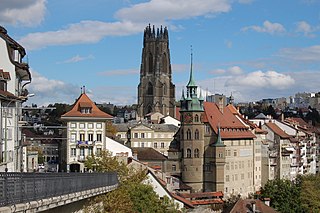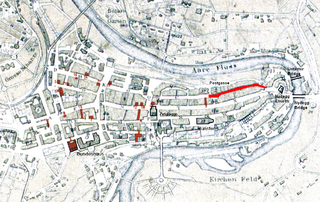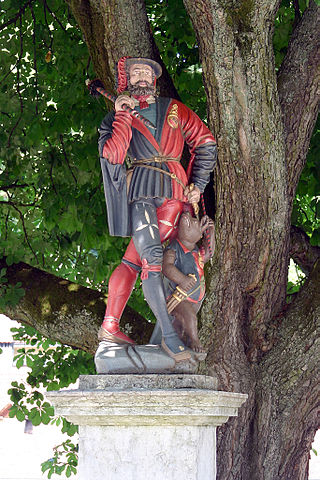
The Anna-Seiler-Brunnen (Anna Seiler Fountain) is a fountain on Marktgasse in the Old City of Bern, Switzerland. It is a Swiss Cultural Property of National Significance [1] and is part of the UNESCO World Heritage Site of the Old City of Bern.

The Anna-Seiler-Brunnen (Anna Seiler Fountain) is a fountain on Marktgasse in the Old City of Bern, Switzerland. It is a Swiss Cultural Property of National Significance [1] and is part of the UNESCO World Heritage Site of the Old City of Bern.
The fountain, located at the upper end of Marktgasse memorializes the founder of the first hospital in Bern. Anna Seiler is represented by a woman in a blue dress, pouring water into a small dish. She stands on a pillar brought from the Roman town of Aventicum (modern Avenches). On 29 November 1354 in her will [2] she asked the city to help found a hospital in her house which today stands on Zeughausgasse. The hospital initially had 13 beds and 2 attendants [3] and was to be an ewiges Spital [2] or a perpetual hospital. When Anna died around 1360 [4] the hospital was renamed the Seilerin Spital. In 1531 the hospital moved to the empty Dominican Order monastery St. Michaels Insel (St. Michael's Island) and was then known as the Inselspital, which still exists over 650 years after Anna Seiler founded it. The modern Inselspital has about 6,000 employees and treats about 220,000 individuals per year. [5]

Bern, or Berne, is the de facto capital of Switzerland, referred to as the "federal city". With a population of about 133,000, Bern is the fifth-most populous city in Switzerland, behind Zürich, Geneva, Basel and Lausanne. The Bern agglomeration, which includes 36 municipalities, had a population of 406,900 in 2014. The metropolitan area had a population of 660,000 in 2000.

Fribourg or Freiburg is the capital of the Swiss canton of Fribourg and district of La Sarine. Located on both sides of the river Saane/Sarine, on the Swiss Plateau, it is a major economic, administrative and educational centre on the cultural border between German-speaking and French-speaking Switzerland. Its Old City, one of the best-maintained in Switzerland, sits on a small rocky hill above the valley of the Sarine. In 2018, it had a population of 38,365.
Lohnstorf is a former municipality in the Bern-Mittelland administrative district in the canton of Bern in Switzerland. On 1 January 2020 the former municipalities of Kirchenthurnen, Lohnstorf and Mühlethurnen merged to form the municipality of Thurnen.

Rothenbrunnen is a municipality in the Viamala Region in the Swiss canton of Graubünden.

Hans Gieng was a Swiss Renaissance sculptor best known for his public fountain figures in the Old Town of Bern as well as Fribourg.

The Old City is the medieval city center of Bern, Switzerland. Built on a narrow hill bordered on three sides by the river Aare, its compact layout has remained essentially unchanged since its construction during the twelfth to the fifteenth century. Despite a major fire in 1405, after which much of the city was rebuilt in sandstone, and substantial construction efforts in the eighteenth century, Bern's old city has retained its medieval character.

The Inselspital, also named the University Hospital of Bern, located in Bern, is one of the five university hospitals of Switzerland. It is associated with the University of Bern.
Bümpliz-Oberbottigen is a Stadtteil (district) of the city of Bern, Switzerland. It is situated to the west of the city center and consists of the Quartiere (quarters) Bümpliz, Oberbottigen, Stöckacker, Bethlehem and Brünnen.

The Herrengasse is one of the streets in the Old City of Bern, the medieval city center of Bern, Switzerland. It was the southernmost street of the old Zähringerstadt of Bern and ended at the first city wall. Three buildings on the Herrengasse are listed on the Swiss inventory of heritage site of national significance and it is part of the UNESCO Cultural World Heritage Site that encompasses the Old City.

The Aarbergergasse is one of the streets in the Old City of Bern, the medieval city center of Bern, Switzerland. It was originally the most important of the five streets that were part of the Äussere Neustadt, which was the section outside the city walls. One fountain, the Ryfflibrunnen on the Aarbergergasse is listed on the Swiss inventory of heritage site of national significance and it is part of the UNESCO Cultural World Heritage Site that encompasses the Old City.

The Amthausgasse is one of the streets in the Old City of Bern, the medieval city center of Bern, Switzerland. It is part of the Innere Neustadt which was built during the expansion of 1255 to 1260.

The Marktgasse is one of the streets in the Old City of Bern, the medieval city center of Bern, Switzerland. It is part of the Innere Neustadt which was built during the 13th Century. It runs from the Käfigturm between Waisenhausplatz and Bärenplatz in the west to the Zytglogge between Kornhausplatz and Theaterplatz in the east. It is part of the UNESCO Cultural World Heritage Site that encompasses the Old City.

The Postgasse is one of the streets in the Old City of Bern, the medieval city center of Bern, Switzerland. It is part of the Zähringerstadt which was built during the foundation of the city in 1191. It runs from Nydeggstalden near the Aare river in the east to the transverse Kreuzgasse, where the name changes to Rathausgasse. It is part of the UNESCO Cultural World Heritage Site that encompasses the Old City.

The Spitalgasse is one of the streets in the Old City of Bern, the medieval city center of Bern, Switzerland. It is part of the Äussere Neustadt which was built during the third expansion from 1344 to 1346. The eastern end is at Waisenhausplatz and Bärenplatz while the western end is at Bahnhofplatz near the Church of the Holy Ghost. It is part of the UNESCO Cultural World Heritage Site that encompasses the Old City.

The Pfeiferbrunnen is a fountain near Spitalgasse 21 in Bern, Switzerland. It is one of the Old City of Bern's 16th-century fountains and is part of the list of Swiss heritage sites of national significance.

The Church of the Holy Ghost is a Swiss Reformed Church in Bern, Switzerland. The Swiss heritage site of national significance building is located at Spitalgasse 44 in the Old City of Bern. It is one of largest Swiss Reformed churches in Switzerland.

The Zeughausgasse is one of the streets in the Old City of Bern, the medieval city center of Bern, Switzerland. It is part of the Innere Neustadt which was built during the second expansion in 1255 to 1260. The eastern end is at Kornhausplatz while the western end is at Waisenhausplatz. It is part of the UNESCO Cultural World Heritage Site that encompasses the Old City.

The Läuferbrunnen is a fountain on Läuferplatz in the Old City of Bern, Switzerland. It is a Swiss Cultural Property of National Significance and is part of the UNESCO World Heritage Site of the Old City of Bern.

The Vennerbrunnen is a fountain on Rathausplatz in the Old City of Bern, Switzerland. It is a Swiss Cultural Property of National Significance and is part of the UNESCO World Heritage Site of the Old City of Bern.
The following is a timeline of the history of the municipality of Bern, Switzerland.